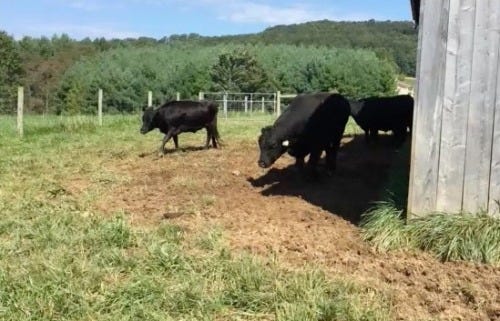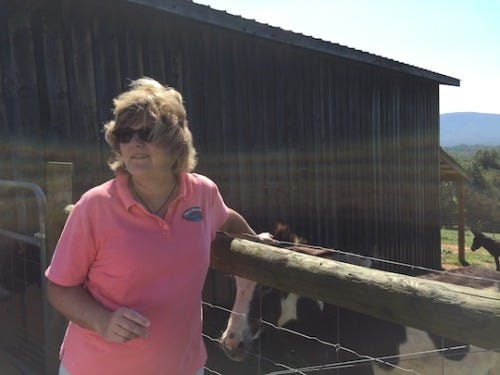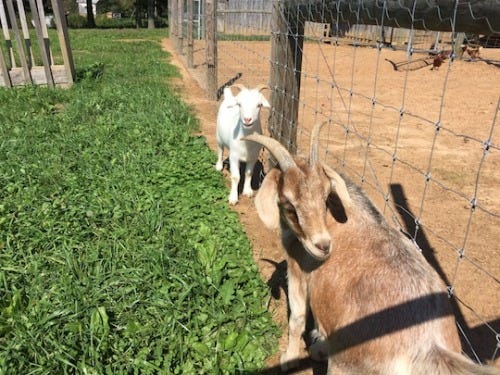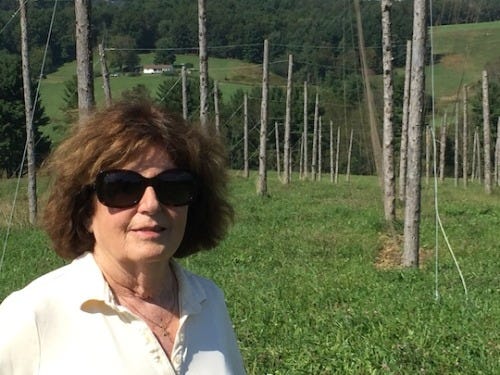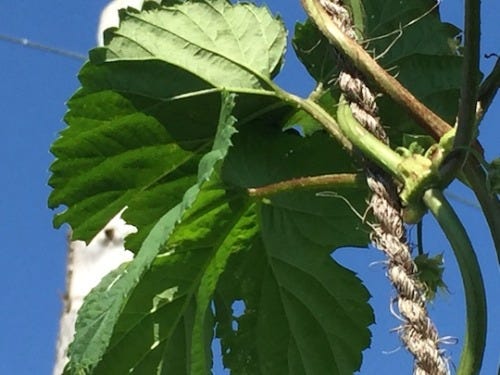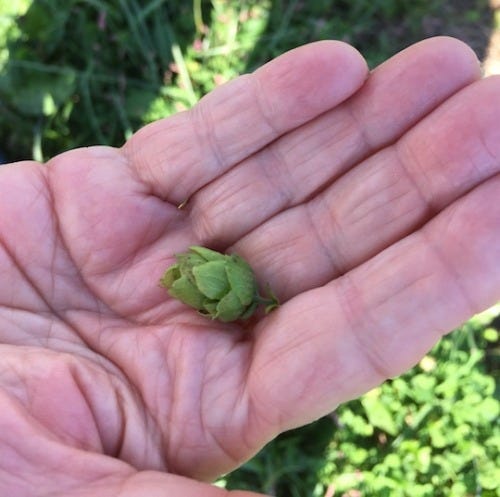It’s a dramatic and spirit-lifting drive along the six-mile stretch of NC Highway 18 from Cumberland Knob Recreation Area in Surry County, NC, to the community of Ennice in northern Alleghany County. The highway unrolls to the west like a ribbon along the ridgetops, almost in sight of the Virginia state line. To the south and west, long, peaceful views of grazing cattle and symmetrical fields of boxwood and Christmas trees undulate toward Bullhead Mountain, a landmark on the Blue Ridge Parkway. Beyond Ennice, the road runs down to the county seat of Sparta, where I was headed for a weekend of food and festivities associated with my book, The Month of Their Ripening. I was hosted by Alleghany Writers, a scrappy literary group with a big vision in this small mountain county populated by hard working farmers and joyful retirees. Some residents qualify in both categories, as did the two families I met on the first day of my visit.
The visiting bull (right) on the move to a different pasture
Before moving permanently to Alleghany County, Ricky Brown lived in several NC cities as a senior bank executive. He and his wife, Kim, had been childhood sweethearts in the eastern NC town of Robersonville in Martin County where cotton and tobacco are the primary products. The Browns moved into the cattle business when their daughter Sara declared she wanted to become an organic farmer. While Sara went off to study at The Farm School in Athol, MA, followed by a volunteer stint for Heifer International, Ricky took early retirement and found some 175 rolling acres that had formerly been planted in Christmas trees. Then Kim’s sister Lynn Perry and her mother, Doris Perry, joined the Browns in the mountains.
Chilly Water Farm’s Kim Brown and Levi, a standard donkey
Today Chilly Water Farm raises Dexter and Angus beef cattle without hormones and antibiotics. The herd feeds exclusively on grass and hay, rotating every two days through a series of paddocks that keep the pasture grass thriving. Each year Chilly Water sells a limited quantity of high quality steakburger meat by the pound to local customers and to select Winston-Salem restaurants.
“The burgers are made from everything but the short ribs and soup bones,” Kim explained, as we set out toward the chicken pen. (Chilly Water also sells eggs and uses chicken fertilizer for the garden.) “We recently got rid of the rooster,” Kim continued. “He drove the girls crazy. They didn’t need that. We are all about harmony here.” She grinned.
The farm menagerie involves several dogs, including a Jack Russell terrier named Opie, a standard donkey named Levi, and eight miniature donkeys, all female, who keep him company.
“These animals are for nothing but peace and joy,” Kim said, as the small herd trotted over to greet and nudge us for head rubs along the fence. Nearby, Little Jack, a rescue goat, was penned with his companion, Watson, also seeking an audience with the humans. More goats played up the hill in a separate pen near an heirloom apple tree that was loaded with yellow fruit. Kim explained that only the goat named Elvis could possibly be a candidate for a meal, leaving us to wonder about his offenses.
Watson in foreground and Little Jack, the rescue goat
After paying our respects to these “house” animals, sister Lynn joined us as we climbed onto a four-seat gator and sailed across the pristine fields to get a closer look at the horses and cattle down in the holler, including an enormous visiting bull who quickly showed us his stuff. We laughed as Lynn put on her mucking boots and hopped off the vehicle to lead the herd through the gate to their next grazing destination. Then we shot forward again, bouncing and angling downhill and then uphill again on a washed-out trail through dense white pines, mature hardwoods, and an occasional Norwegian fir.
When we stopped to observe the pond from the far side of the woods, the sisters reminisced about their grandmother’s unforgettable molasses cake recipe that they had asked her to share with them as her health was failing. The ingredients, as it turned out, were the last words she spoke to her granddaughters. “But when we made it, it didn’t turn out like we remembered,” said Lynn, now amused by the memory. “I think she maybe didn’t give us all that the cake called for.”
“Of course, she never measured anything anyway,” Kim added. “Just a pinch of that and a spoonful of this.”
Back at the house, Ricky had cooked juicy and tender steakburgers on the grill and Doris set out a buffet of green beans, okra, fresh sliced tomatoes, stewed apples from the tree outside, and crisp homemade pickles and jalapenos. After such a feast, I hated to leave Chilly Waters, but I presented my kind hosts with a signed copy of the book and headed out to my next destination.
***
Frances Huber grew up in the tony Buckhead section of Atlanta but started coming to Alleghany County for family retreats as a ten-year-old. Now, just past 80, she is raising Angus breeding stock. She used to sell her cattle for beef, but today she raises the original Angus that have shorter legs and carry more meat than their big-boned, genetically modified relatives. “Now I don’t have to apologize when I sell them off,” Frances explained, “because they are not going off to be processed but are headed for breeding.”
Huber, assisted by a full-time farm manager and an occasional student intern, also raises all-natural, forest-grazing hogs that were lolling around the edge of the woods alongside the cattle as I made my way down the treelined drive to the two-story frame house that she and her late husband, Andy, built in the 1990s.
Long before her organic farming adventure started, Frances read Rachel Carson’s Silent Spring and developed an interest in holistic medicine. With Andy, who was a Cornell graduate in agriculture, the Hubers bought this abandoned dairy farm in 1994 and raised hay and horses without the use of chemical fertilizers, herbicides, or pesticides. “The weeds will tell you what’s wrong with your soil,” Frances explained. She taught herself how to correct deficiencies in the dirt with natural applications of minerals such as gypsum to get the pH right.
Frances Huber of Brush Creek Farm
After her husband died of a debilitating cancer of the spine in 2000, Frances did not want to leave the farm. With her daughter’s help, she opened the land to families and busloads of schoolchildren who visited her newly acquired collection of petting animals. She also created a store and planted a whimsical garden on the farm. While she loved the children who came to visit and learn from her, Frances said, “It was like running Carowinds. Too much.” She laughed.
Now Huber has put her 200-plus acres into conservation easements, including the land that provides the most extraordinary view from her screened porch toward Bullhead Mountain. She then challenged her children to come up with a crop they could raise on a portion of the land. The only requirement was that no chemicals be used in the process. Her son who is a bond trader and her daughter who is in marketing came up with the idea of hops and planted citrus hops from five sources last year on a single acre. “An acre of hops is a lot,” Frances said. “I told them I would give them the rest of that sloping field if it went well.”
Hops growing on a rope of organic hemp
I had never seen hops growing. Though most of the first crop had been harvested by the time of my visit, a few vines still climbed upward from the ground on organic hemp ropes suspended from wires strung high above on ten-foot poles that were set out in a grid pattern. Clearly the infrastructure for this crop took no small effort to construct. Frances explained that they had to hire a grappler to install the poles while two of her grandsons helped to site and move the heavy poles. Huber’s daughter spent hours digging trenches out of thick sod between poles and amending the soil under the wires where they would plant the ten rows of hops. Each row required constant weeding. The siblings chronicled each variety carefully and found no signs of mildew, though some bugs did come along. They declared the first harvest a success. Frances now admits that she was not sure if the kids would pull it off, but they did. Their new business cards say “Huber Hops.” Perhaps these flavorful ingredients will be coming to a craft brewer near you.
Hops in hand
Two nights later, before I gave a talk about the new book at a farm-to-table dinner for seventy guests in support of the Alleghany Writers’ Development Fund for creative writing in the local schools, I had a chance to sample Frances Huber’s Brush Creek Farm pork tenderloin and chorizo. Local chef Garrison Wagoner used the just-this-side-of-fiery chorizo to stuff succulent mushrooms. It was a most satisfying burn.
The tenderloin served next needed no accompaniment. Huber’s forest-fed pork was like none I have ever had in memory. Soft, sweet, tender, pale, and without any obvious grain in the meat nor toughness. In short, remarkable. A few days later I would hear just the right phrase, supposedly posted outside a BBQ joint in Mississippi—“You don’t need teeth to eat our meat.” That is how tender it was and how easy the visit to this rural enclave. Thanks to Alleghany Writers’ leader Ginger Collins, the Brown family, and Frances Huber for the high-country hospitality.





